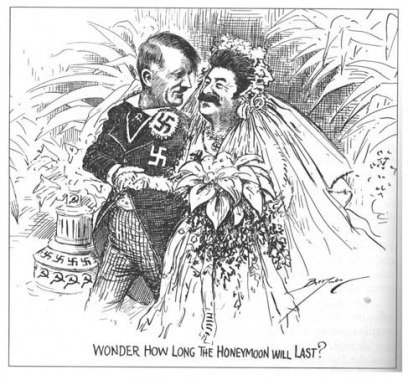17. Nazi-Soviet Non-Aggression Pact:
A.
The Nazi-Soviet Non-Aggression Pact, also known as the German-Soviet Non-Aggression Pact and the Ribbentrop-Molotov Pact, was signed between Soviet Foreign Minister Vyacheslav Molotovand and German Foreign Minister Joachim von Ribbentrop on Aug 23, 1939. Publicly, this agreement stated that the two countries would not attack each other, nor would they interfere with each other in case of war. However, the treaty also included a Secret Protocol, which divided Poland in two, and both countries are granted the right to seize their respective half.
The Nazi-Soviet Non-Aggression Pact, also known as the German-Soviet Non-Aggression Pact and the Ribbentrop-Molotov Pact, was signed between Soviet Foreign Minister Vyacheslav Molotovand and German Foreign Minister Joachim von Ribbentrop on Aug 23, 1939. Publicly, this agreement stated that the two countries would not attack each other, nor would they interfere with each other in case of war. However, the treaty also included a Secret Protocol, which divided Poland in two, and both countries are granted the right to seize their respective half.
B.
Cooperation:
Both Hitler and Stalin relied on the Treaty to fulfill different purposes, the former needed it for offense, and the later needed it for defense.
National Security:
By agreeing not to attack each other, both counties gained the security they desired.
Internationalism:
In this case, the common interest between the two nations was time. Hitler needed time to carry out his plans, and Stalin needed time to strengthen his country.
Cooperation:
Both Hitler and Stalin relied on the Treaty to fulfill different purposes, the former needed it for offense, and the later needed it for defense.
National Security:
By agreeing not to attack each other, both counties gained the security they desired.
Internationalism:
In this case, the common interest between the two nations was time. Hitler needed time to carry out his plans, and Stalin needed time to strengthen his country.
C.
After six years of preparations, Hitler was finally ready to go to war in 1939. However, he still had one issue that has not been resolved yet: the possibility of a two-front war. During World War I, Germany was faced with the same problem, and the inability to resolve that problem drastically weaken the German forces. This would also later contribute to German losses in the end. Hitler was determined not to repeat the same mistakes his ancestors did. Thus, on Aug.23, 1939, the Nazi-Soviet Non-Aggression Pact was signed between Nazi Germany and Soviet Russia. To Hitler, the main goal of the Pact was to prevent the Soviets from interfering when he attacked Poland. On the other hand, the Secret Protocol was meant to prevent the Soviets from ever joining the war, period. In essence, Hitler “bribed” Russia with half of Poland for their neutrality, a bribe which he will take back two years later with Operation Barbarossa. The Nazi-Soviet Non-Aggression Pact was a win-win situation, as both Germany and Russia gained from the agreement. Germany now won’t have to worry about a two front war (at least not until two years later), and the Soviet Union in the mean time gained precious time to rebuilt after the famines and Purges in Russia.
After six years of preparations, Hitler was finally ready to go to war in 1939. However, he still had one issue that has not been resolved yet: the possibility of a two-front war. During World War I, Germany was faced with the same problem, and the inability to resolve that problem drastically weaken the German forces. This would also later contribute to German losses in the end. Hitler was determined not to repeat the same mistakes his ancestors did. Thus, on Aug.23, 1939, the Nazi-Soviet Non-Aggression Pact was signed between Nazi Germany and Soviet Russia. To Hitler, the main goal of the Pact was to prevent the Soviets from interfering when he attacked Poland. On the other hand, the Secret Protocol was meant to prevent the Soviets from ever joining the war, period. In essence, Hitler “bribed” Russia with half of Poland for their neutrality, a bribe which he will take back two years later with Operation Barbarossa. The Nazi-Soviet Non-Aggression Pact was a win-win situation, as both Germany and Russia gained from the agreement. Germany now won’t have to worry about a two front war (at least not until two years later), and the Soviet Union in the mean time gained precious time to rebuilt after the famines and Purges in Russia.
Copyright ©2009 by Ben Pi, Tony Fu, Amere Huang, Jeff Fong, Edwin Li, Irena Liu SS 20IB

